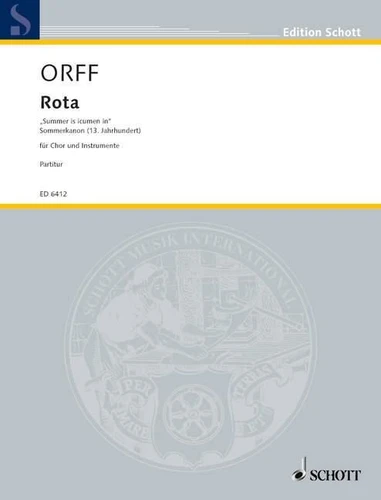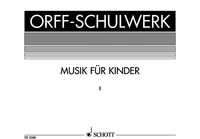Edition Schott
Rota. "Sumer is icumen in". mixed choir (STBar) and instruments. Partition.
Par : Formats :
- Paiement en ligne :
- Livraison à domicile ou en point Mondial Relay indisponible
- Retrait Click and Collect en magasin gratuit
- Réservation en ligne avec paiement en magasin :
- Indisponible pour réserver et payer en magasin
- Nombre de pages32
- Poids0.136 kg
- ISBNM-001-06808-3
- EAN9790001068086
- Date de parution01/01/1976
- ÉditeurSchott
Résumé
The first known canon of European art music, now in the British Museum in London, is preserved in a thirteenth-century manusript from the English abbey in Reading : This is the so-called "summer canon", whose verses greet the advent of summer. An accompanying note elucidates the artistic layer-like construction of the sound structure : a two-voice foundation of bell-like, swinging pendulum tones supports an upper structure of four voices which enter at equal time intervals.
The note terms the canon "rota" - round -, which makes reference to the turning, circling movement of the constantly pulsating sound. The circular figure originates in a vital, ages-old moving force in music-making, and it demands a dance-like execution. But the canon is also, through the interaction of the strictly ordered voice entries, convivially bound musical form. Carl Orff was able to choose no better fitting musical form for the "Greetings to Youth" at the Olympic Games 1972 in Munich than the medieval rota.
In the connexion of the singing voices with the Orff instruments, today in world-wide use, a testimony of European tradition sounds in a living present. Instrumentation : mixed choir (STBar) and instruments
The note terms the canon "rota" - round -, which makes reference to the turning, circling movement of the constantly pulsating sound. The circular figure originates in a vital, ages-old moving force in music-making, and it demands a dance-like execution. But the canon is also, through the interaction of the strictly ordered voice entries, convivially bound musical form. Carl Orff was able to choose no better fitting musical form for the "Greetings to Youth" at the Olympic Games 1972 in Munich than the medieval rota.
In the connexion of the singing voices with the Orff instruments, today in world-wide use, a testimony of European tradition sounds in a living present. Instrumentation : mixed choir (STBar) and instruments
The first known canon of European art music, now in the British Museum in London, is preserved in a thirteenth-century manusript from the English abbey in Reading : This is the so-called "summer canon", whose verses greet the advent of summer. An accompanying note elucidates the artistic layer-like construction of the sound structure : a two-voice foundation of bell-like, swinging pendulum tones supports an upper structure of four voices which enter at equal time intervals.
The note terms the canon "rota" - round -, which makes reference to the turning, circling movement of the constantly pulsating sound. The circular figure originates in a vital, ages-old moving force in music-making, and it demands a dance-like execution. But the canon is also, through the interaction of the strictly ordered voice entries, convivially bound musical form. Carl Orff was able to choose no better fitting musical form for the "Greetings to Youth" at the Olympic Games 1972 in Munich than the medieval rota.
In the connexion of the singing voices with the Orff instruments, today in world-wide use, a testimony of European tradition sounds in a living present. Instrumentation : mixed choir (STBar) and instruments
The note terms the canon "rota" - round -, which makes reference to the turning, circling movement of the constantly pulsating sound. The circular figure originates in a vital, ages-old moving force in music-making, and it demands a dance-like execution. But the canon is also, through the interaction of the strictly ordered voice entries, convivially bound musical form. Carl Orff was able to choose no better fitting musical form for the "Greetings to Youth" at the Olympic Games 1972 in Munich than the medieval rota.
In the connexion of the singing voices with the Orff instruments, today in world-wide use, a testimony of European tradition sounds in a living present. Instrumentation : mixed choir (STBar) and instruments




















